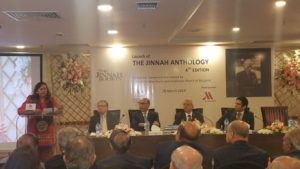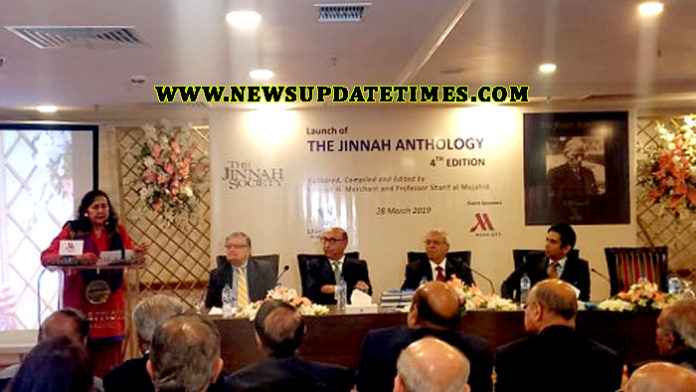Karachi (Muhammad Yasir) The Jinnah Society in conjunction with Lightstone Publishers Limited, launched the fourth edition of “The Jinnah Anthology”. The recent edition like the other three has been compiled and edited by Liaquat Merchant and Professor Sharif al Mujahid.
Unlike most other books on the Quaid, which are either biographies, histories, records, or recollections, the contents of ‘The Jinnah Anthology’ are uniquely varied. There is something of interest and value for everyone – the scholar as well as the student, the historian and the general reader. Adding to the value of the book is the fact that some of the material has never been published before, and much, if published, was heretofore inaccessible to the general reader – if not because of the specialized nature of the original publication, then the sheer time span or variety of sources. The previous editions have often been referred to as the best reference books on Jinnah in Pakistan.
In his welcome address, Liaquat Merchant S.I. President, The Jinnah Society said that in order to understand the reasons behind the creation of Pakistan and why the idea of Pakistan will never die, one has to cross the bridge which is “Jinnah”. Some people have criticized Jinnah’s ‘Two Nation Theory’ and his struggle for the creation of a separate Muslim homeland. It must be remembered that Jinnah convinced the Minority Muslim Community in India that they were, in fact a Nation. With the emergence of Pakistan as an independent Nation, the Muslims got over British exploitation and Hindu domination. The new Nation gave the Muslims an opportunity to freely practice and propagate their religious faith. Jinnah wanted the Muslims to achieve Political and Economic independence. While the former is a fact, the latter remains a much-desired necessity. The Jinnah Society has been propagating the principles, ideals and vision of Mr. Jinnah as a Nation building exercise and in the hope of development of leadership in the role model of Jinnah – a Leader respected for his private honor and public integrity. This is why the demand for “Jinnah’s Pakistan” is almost unanimous in the media and across the political divide.
On this occasion, Sikandar Hayat, Professor of History, FC College Lahore and the author of the book ‘The Charismatic Leader Quaid-i-Azam Mohammad Ali Jinnah and the Creation of Pakistan’ said that the idea should be to make the Anthology appeal not only to the general public, average educated readers, … but also to a specialized, scholarly audience, comprising teachers, researchers, and postgraduate students working on Modern South Asia, both at home and abroad…. This Anthology cannot, and should not, be taken as a coffee table book, for, in my opinion, it is not! It’s serious work.’
Guest speaker Yasser Latif Hamdani, Advocate High Court, Visiting Fellow (Harvard Law School) & Member of The Honorable Society of Lincoln’s Inn said that “Everyone talks about the kind of state Jinnah wanted. What no one talks about is what he would not have wanted. He would not want a Pakistan where any citizen is discriminated against on the basis of faith. He would not have wanted a Pakistan where anyone is made to feel like a second-class citizen or where the state would determine matters of the faith for its people. He would not have wanted a state where unelected state institutions ride roughshod over elected institutions and the will of the people.” Yasser Latif Hamdani is also the author of the book ‘Jinnah, Myth and Reality’.
In his address, Abdul Basit, Former High Commissioner of Pakistan to India said that “Quaid e Azam succeeded in creating Pakistan but we as a nation failed to live up to his ideals. Fundamentally speaking what we need to do is to bridge democracy and knowledge deficits; break the economic gridlock; and work towards promoting cultural harmony. We must have a well-integrated plan and willingness to implement it. Half-hearted measures will take us nowhere. We cannot realistically expect to build a strong and prosperous Pakistan by giving short shrift to Quaid’s vision. It’s time to revert to him and address both our internal and external challenges with strategic thinking and tactical sleight of hand.”
In her closing remarks, Ameena Saiyid OBE, S.I and Secretary General, The Jinnah Society said that ‘The Jinnah Anthology’ 4th edition is a critical source of information on someone who is above controversy and worthy of emulating. Jinnah is a perfect role model for our youth, who need to study him deeply. Only independent research, a careful examination of the diverse opinions of him, and a search for the real Jinnah and not the one ‘created’ or ‘imagined’ by other people’s vested interests and ideologies can dispel the many myths that surround him. The Jinnah Anthology brings out the real Jinnah- Pakistanis have been looking for. It will also constitute an excellent reference book on the Founder of Pakistan.
The contents of the 4th edition of ‘The Jinnah Anthology include rare photographs, personal recollections of contemporaries of the Quaid with Princess Abida Sultaan of Bhopal, Sahabzada Yaqub Ali Khan, Begun Shaista lkramullah, Yusuf Haroon, Syed Hashim Raza, Justice Z. A. Chana, Sharifuddin Pirzada and Ata Rabbani. S. M. Burke gives a historian’s perspective of Jinnah. There are impressions given by Beverly Nichols, Lady Wavell, Aga Khan III, and Edgar Snow; and a study with additional articles by Liaquat Merchant, who is the Quaid’s grand-nephew and president of the Jinnah Society and co-author and editor Professor Sharif al Mujahid. Akbar S. Ahmed writes about what he calls Jinnah’s ‘Gettysburg Address’, and Stanley Wolpert presents a new tribute. There are excerpts from various speeches and statements of Jinnah, shorter quotes from him, as well as the famous quote of Wolpert about him. The book reproduces The Times (London) obituary of Jinnah, Jinnah’s will, and telling portions of high court judgments (on the case related to property instituted after the death of Mohtarma Fatima Jinnah) pertaining to Mr Jinnah’s personal faith and sectarian beliefs.
The Jinnah Society was established on 23rd April 1997 at Karachi and has completed 20 years of existence in Pakistan. The main objective of the Society is to propagate the principles, ideals and vision of Quaid-e-Azam as a nation building exercise and in the development of democratic leadership in the role model of Mr. Jinnah.







